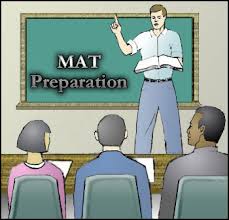
The Management Admissions Test or MAT is the entrance exam for admission into various B-Schools. The MAT entrance is by far the most popular entrance test that most students tend to opt for. MAT is an entrance that is conducted at a national level. The MAT entrance assesses candidates on the following parameters namely English (grammar, reading and comprehension skills and vocabulary), Mathematics, Data Interpretation, Logical Thinking, General Knowledge and Speed. The Management Aspirants are bound to be excited and tend to be anxious since the examination is round the corner. But don’t fret; here are a few tips that can help you to perform well on the entrance examination.
 Tip 1 English: The MAT is usually tough for students who aren’t confident about their command over the English Language therefore it is a challenge for most individuals. Since this is a language, by default grammar is very essential. Apart from these aspects it definitely comprises of questions on analogies, synonyms and antonyms, match the list, idioms, one word for many and fill in the blank which is a task for such applicants.
Tip 1 English: The MAT is usually tough for students who aren’t confident about their command over the English Language therefore it is a challenge for most individuals. Since this is a language, by default grammar is very essential. Apart from these aspects it definitely comprises of questions on analogies, synonyms and antonyms, match the list, idioms, one word for many and fill in the blank which is a task for such applicants.
- Grammar: A useful tool to improve your language skills is by referring to Wren & Martin. This book is a perfect guide for improving your grammar as well as your comprehension skills because it has exercises and examples for each topic. It also comes with a key that you can use to verify if your answers are correct.
- Reading and Comprehension: you need to get your hand on a copy of the Wren & Martin as soon as possible as it has very good examples for improving you comprehension skills. It has sample passages that contain questions on most of the aspects covered in the English section.
- Expose yourself to the language: you can start by making use of the various resources available to you such as the internet, newspapers, journals, magazines, television, books etc. Most importantly converse with a friend who is good at the language if possible, it is the most effective way to increase your confidence. It is absolutely essential for you to make a habit of reading as this is one of the best ways to improve your language skills. Reading English newspapers, listening to English news and try to write a few sentences in English will definitely help you in the long run. When you read; it not only helps you to improve your grammar but it also increases your vocabulary. When you come across a word that you do not understand make it a point to open a dictionary therefore ensure that you have a dictionary nearby whenever you read something.
Tip 2 Mathematics: The Key to doing well in mathematics is by practicing as much as you can. You need to understand the concepts well, before you start solving problems. Rather than mugging the formulas it is preferable to understand the concepts and get them cleared. If you have a thorough knowledge of the concepts, you will be able to solve any problem that may come your way. It is essential that you are thorough with concepts of force – momentum, calculus and its application, matrices, trigonometry, shares and dividends, properties of logarithms, equation of circle, parabola, ellipse, conditional probability etc. as these types of questions are most likely to come. You need to know the formulas on the tip of your fingers your mental calculations should also be strong so that you can come up with your own short cuts. This is an important skill as you will definitely benefit from it. When practicing, “practice as though you are the worst, but perform as if you are the best”.
Tip 3. Logical Analysis/ Thinking: when a problem is given don’t just solve it try to analyze it for 20 to 30 minutes by asking your W/H questions such as Why, What, How. The reasoning section consists of questions based on logical, analytical, critical reasoning, deductive reasoning, syllogisms and connectives therefore they are framed accordingly. So whenever you read a passage don’t forget to put on you thinking hat and ask your W/ H questions as often as possible
Tip 4. Data Interpretation: this section mainly consists of questions that use bar graphs or pie charts to interpret data and similarly the questions are based on the data that is interpreted. So break up the question and note down the information that is given to you.
Tip 5. General Knowledge: read newspapers and watch educational channels that will boost your general knowledge.
Tip 6. Speed: remember that time is of essence and it is important that you solve as many questions as you can. Since these questions deal with how much you are able to finish within a set time limit, it is all the more important to come up with short cuts.
Tip 7. Group Discussions: try to be loud and aggressive in an appropriate manner, if you need to get your point across. If unclear about the topic wait for someone else to begin. Try and summarize the points that have been discussed as and when appropriate.
